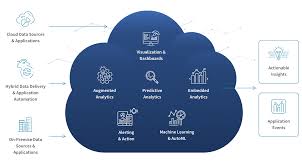The Power of Cloud Data Analytics
In today’s digital age, data is the lifeblood of businesses. The ability to collect, analyse, and derive insights from data is crucial for making informed decisions and gaining a competitive edge. This is where cloud data analytics comes into play.
Cloud data analytics refers to the process of analysing large volumes of data stored in the cloud using advanced tools and techniques. By leveraging the scalability, flexibility, and cost-effectiveness of cloud computing, businesses can unlock the full potential of their data.
Benefits of Cloud Data Analytics
Scalability: One of the key advantages of cloud data analytics is its scalability. Businesses can easily scale up or down their computing resources based on their needs, allowing them to handle large datasets without worrying about infrastructure limitations.
Cost-Effectiveness: Cloud data analytics eliminates the need for costly on-premises hardware and maintenance. Businesses pay only for the resources they use, reducing upfront capital expenditures and operational costs.
Flexibility: Cloud data analytics offers unparalleled flexibility in terms of storage options, processing power, and analytical tools. Businesses can choose from a wide range of services to customise their analytics environment according to their requirements.
Challenges and Considerations
While cloud data analytics offers numerous benefits, it also presents challenges that businesses need to address:
- Data Security: Ensuring the security and privacy of sensitive data stored in the cloud is paramount. Businesses must implement robust security measures to protect their information from cyber threats.
- Data Governance: Establishing clear policies and procedures for managing data quality, integrity, and compliance is essential for effective data analytics in the cloud.
- Data Integration: Integrating disparate sources of data from various systems can be complex. Businesses need to ensure seamless integration to derive meaningful insights from their datasets.
The Future of Cloud Data Analytics
The future of cloud data analytics looks promising as advancements in artificial intelligence (AI) and machine learning continue to enhance analytical capabilities. With real-time processing, predictive analytics, and actionable insights at their fingertips, businesses can drive innovation and growth like never before.
Seven Essential Tips for Effective Cloud Data Analytics Management
- Ensure data security and compliance with regulations.
- Choose the right cloud service provider based on your needs.
- Implement efficient data governance practices.
- Utilise scalable cloud infrastructure for handling large datasets.
- Invest in training for employees to maximise the benefits of cloud analytics tools.
- Regularly monitor and optimise costs associated with cloud data analytics.
- Integrate different data sources for comprehensive analysis.
Ensure data security and compliance with regulations.
Ensuring data security and compliance with regulations is paramount when utilising cloud data analytics. Businesses must implement robust security measures to protect sensitive information stored in the cloud from cyber threats. Additionally, adherence to data governance regulations is crucial for maintaining data integrity and ensuring legal compliance. By prioritising data security and regulatory compliance, businesses can leverage the benefits of cloud data analytics while safeguarding their valuable data assets.
Choose the right cloud service provider based on your needs.
When venturing into cloud data analytics, it is crucial to select the appropriate cloud service provider that aligns with your specific requirements. Different providers offer varying features, pricing structures, and levels of support, so it is essential to conduct thorough research and evaluate your needs before making a decision. By choosing the right cloud service provider tailored to your business objectives, you can maximise the benefits of cloud data analytics and ensure a seamless and efficient analytical process.
Implement efficient data governance practices.
Implementing efficient data governance practices is essential for successful cloud data analytics initiatives. By establishing clear policies and procedures for managing data quality, integrity, and compliance, businesses can ensure that their data is accurate, secure, and accessible. Data governance helps maintain consistency across datasets, enables effective collaboration among teams, and mitigates risks associated with data misuse or non-compliance. With robust data governance in place, organisations can maximise the value of their data assets and make informed decisions based on reliable insights derived from cloud analytics.
Utilise scalable cloud infrastructure for handling large datasets.
To maximise the efficiency of data analytics processes, it is recommended to leverage scalable cloud infrastructure for managing extensive datasets. By utilising cloud resources that can easily expand or contract based on data volume requirements, businesses can ensure seamless handling of large datasets without the constraints of traditional on-premises infrastructure. This approach not only enhances data processing capabilities but also offers cost-effective solutions for businesses looking to optimise their data analytics operations.
Invest in training for employees to maximise the benefits of cloud analytics tools.
Investing in training for employees is essential to maximise the benefits of cloud analytics tools. By providing comprehensive training programmes, businesses can empower their staff with the knowledge and skills needed to effectively leverage these tools. Well-trained employees will be able to navigate complex data analytics platforms, interpret insights accurately, and make informed decisions based on data-driven findings. Training not only enhances employee proficiency but also boosts overall productivity and efficiency in utilising cloud analytics tools to drive business growth and success.
Regularly monitor and optimise costs associated with cloud data analytics.
Regularly monitoring and optimising costs associated with cloud data analytics is essential for businesses looking to maximise the value of their data initiatives. By closely tracking usage patterns, identifying inefficiencies, and leveraging cost-effective cloud services, organisations can ensure that they are not overspending on resources. This proactive approach not only helps in controlling expenses but also allows businesses to allocate their budget more strategically, ultimately leading to better ROI and sustainable growth in the long run.
Integrate different data sources for comprehensive analysis.
To maximise the effectiveness of cloud data analytics, it is essential to integrate different data sources for a comprehensive analysis. By combining data from various sources such as databases, applications, and IoT devices, businesses can gain a holistic view of their operations and customer interactions. This integrated approach enables more accurate insights and informed decision-making, ultimately leading to improved efficiency and competitive advantage in today’s data-driven landscape.





